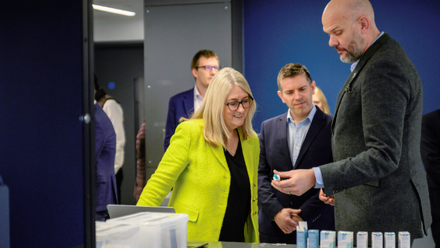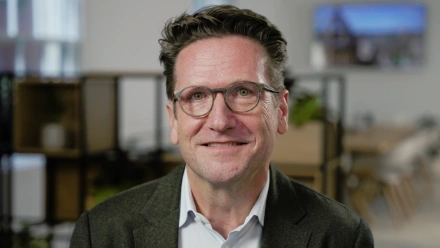#NAW2024: Hélène Trottin's journey through MBA apprenticeship

This National Apprenticeship Week (5-11 February 2024), Hélène Trottin, a Biochemical Engineer and Associate Director Biologics Development Process Siences at Pharmaron, shares her inspiring journey through an MBA apprenticeship and the impact it had on her career.
Can you briefly introduce yourself, what you're doing now and the apprenticeship you were involved in?
My name is Hélène Trottin. Following my Biochemical Engineering studies in France, I started my career in the UK by developing processes for making recombinant proteins. I now have over 10 years’ experience in the pharmaceutical industry, specifically in CMC leading both early and late-stage projects for a range of biologics products.
I currently work as an Associate Director for Pharmaron Biologics, a Gene Therapy CDMO based in Liverpool (UK). My role involves leading our innovation pipeline, providing strategic recommendations for future business opportunities, and managing external collaborations and Drug Product CMO partners on behalf of clients.
In parallel to my work, I have also completed an MBA in 2023, through the ATAC’s Level 7 Senior Leader apprenticeship - an eye-opening and rewarding opportunity!
Were there any specific moments or projects that stood out as particularly impactful?
As part of the apprenticeship, I completed a final research project which focused on ‘how CDMOs can improve innovation’. It was a great opportunity to put into practice the learnings acquired over the last two years, from leadership, to sustainable value creation, strategy, and finance. Before the apprenticeship, I was not directly involved with innovation management, so the project certainly took me out of my comfort zone! But I knew innovation was key to any organisations’ success and had the potential to positively impact Pharmaron, especially as we were transitioning to becoming a CDMO. Through this project, I learned a lot and developed new skills, but perhaps the real satisfaction came when I was able to apply these learnings in my own organisation, and implement changes which really made a difference.
In what ways did the apprenticeship help you develop technical skills relevant to your field?
The leadership skills that I have gained from the apprenticeship have made a real impact in work and in my personal life. I have a scientific/technical background, and it could sometimes be hard to understand why an organisation makes certain decisions, how to propose new business opportunities, or how to challenge working practices in the right way. Through developing my critical thinking and wider business understanding, I now feel as though I have the knowledge and skills to do this. This has been invaluable for my current role, and I am sure I will continue to reap the benefits throughout my career.
How has the apprenticeship contributed to your career path/goals?
The apprenticeship helped me open my mind about the extent of career possibilities in our industry and beyond. It made me more confident about my own capabilities, and how these could be of benefit to both my career and my organisation. I wanted to move into a role with increased responsibilities and strategic focus, in which I could leverage both my scientific background and the newly acquired MBA knowledge/skills. Besides giving me many opportunities to apply theory in practice throughout the apprenticeship, Pharmaron also supported me in those career development reflections. I was glad to see my expanded role and contributions being recognised through a recent promotion to my current Associate Director role, with clear future career progression opportunities.
How important were mentorship and networking in your apprenticeship experience?
I had already seen the benefits of networking from my experience with the BIA MAC LeaP and was keen to continue through the apprenticeship. Although it was distance learning and opportunities to meet were limited due to Covid-19, the ATAC cohort and university student group were great support throughout. But perhaps the best example was during my final project, which I was keen to make stronger by getting input from industry leaders on the process of managing innovation, to compare challenges and share best practices.
Kate Barclay (my ATAC mentor at the time) and Netty England were very helpful and put me in contact with their BIA network. The community has been so supportive and flexible – CEOs, Directors, and other senior leaders agreed to attend an Innovation Focus Group that I chaired. Although everyone around the table were competitors to Pharmaron, they didn’t act as such and were really engaged. We even concluded the meeting by agreeing collectively that we should hold more discussions such as this one. It showed me how valuable network can be and was one of the highlights of my apprenticeship.
What advice would you give to individuals wanting to join an apprenticeship programme, and what advice would you give to companies wanting to take on an apprentice?
Whilst not wanting to go to university full time, the apprenticeship provided me with a great alternative route to reach the same qualification while applying learnings directly to my current role and wider organisation. It is important to know that this almost 3-year apprenticeship is hard work and the more you put in, the more you get out of it. But it should be approached as a marathon, not a race.
I was lucky that Pharmaron was very supportive, both encouraging me and allowing me to commit the time that the programme demands. I would certainly recommend the apprenticeship approach: from application of theory to practice and career development for apprentices, to the acquisition of new specialised skills and talent retention for organisations, the benefits are clearly evident to me!
More news and updates






